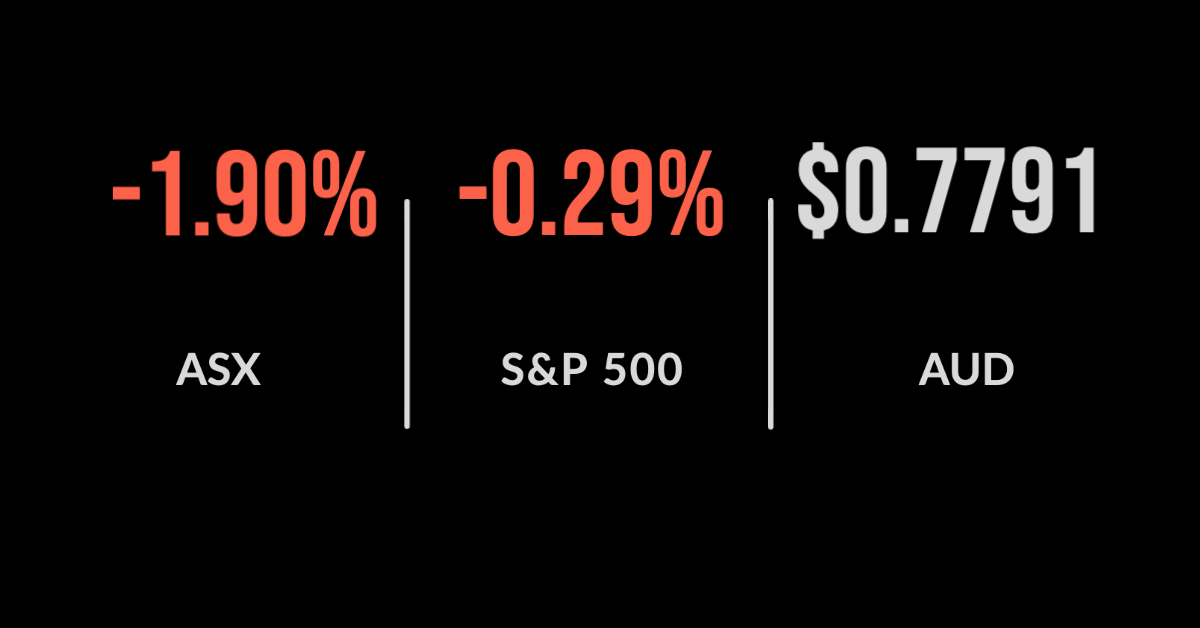Heaviest ASX loss in nearly three months
Markets turn red, EML Payments dumped, China flags iron ore pressure
The ASX200 (ASX:XJO) dropped the most in three months, finishing down 1.9% as a multitude of pressures hit the market.
The materials and energy sectors both fell by around 3.0%, the former sold off after Chinese representatives flagged their intention to reduce the country’s reliance on Australian iron ore, sending the price of BHP Group (ASX:BHP) down 3.4% and Fortescue (ASX:FMG) down 3.1%.
The news of the day, however, was EML Payments (ASX:EML), a gift card and fintech group, which fell 45.6% in a single session after the Central Bank of Ireland outlined major regulatory concerns.
The issues involve the Prepaid Financial Services business acquired in 2019, once again flagging the difficulties for Australian companies expanding overseas.
On the positive side was Appen (ASX:APX), which rallied 17.4% after reiterating previous guidance for revenue of US$260 million and earnings between $83 and $90 million.
The group will also be restructuring in an effort to simplify reporting, to be split into four units including Global, Enterprise, China, and Government divisions.
Wage growth still anaemic, Charter Hall continues to acquire, United Malt profit falls
The latest wage growth data add little to the inflation theme, with wages increasing just 0.6% in the March quarter for a 1.5% annual advance.
Concerns remain around a ‘tight’ labour market with the big driver likely to be when the borders reopen to allow skilled labour to return.
Property manager Charter Hall has capitalised on increasing supply, announcing the purchase of $415 million in new acquisitions including an ATO Building in Box Hill, and Red Cross in NSW.
The group raised $169 million through their Long WALE REIT (ASX:CLW) at a price of $4.65 per share, with another $81 million expected through the retail offer. Shares were down slightly for the 6% yielding trust.
Spin-off United Malt Group (ASX:UMG) reported a 30% fall in profit to $13.2 million after revenue collapsed by 11% to $589.6 million.
Management cited higher supply chain and operating costs behind the weakness; shares finished 1.6% higher.
The pain at Webjet (ASX:WEB) was on clear display, with 9-month revenue hitting just $38.5 million and a loss of $156.6 million, which compares to full-year revenue to June 2020 of $266.9 million.
Sell off continues, Federal Reserve talks tapering, Target smashes expectations
The selloff continued for a third day, with the Dow Jones falling 0.5%, the S&P500 0.3%, and the Nasdaq finishing flat as tech shares rallied once again.
The inflation talk continued to gather steam after the release of the Federal Reserve’s latest minutes, which suggested the interest rate setting committee had quite a strong debate.
The notes discuss the appropriate timing of the removal of the US$120 billion bond-buying program, with the cash rate likely to remain on hold for the foreseeable future.
Bitcoin’s volatility was on full show with the digital asset falling 33% before rising 31% in the same session.
Target’s (NYSE:TGT) position as a pandemic winner and willingness to evolve saw the group report a fivefold increase in earnings per share in the first quarter.
Comparable store sales were up 23% and digital sales 50% on the prior year, with the owned brands division seeing the strongest growth, up 36%.
This suggests those businesses that the company controls, rather than relies on external supply chains, are avoiding inflationary issues. Shares finished 6% higher.







